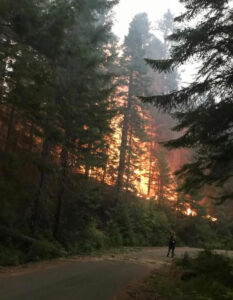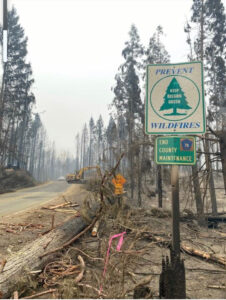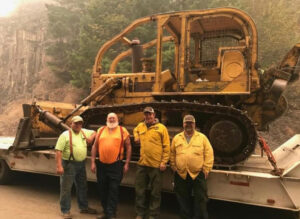Wildland Fire and Community- Mary Nordeen
Wildland Fire and Community



In early September, I left for a wildfire assignment in western Oregon. When I arrived, I was one of 131,000+ fire personnel working on western wildfires. In Roseburg, Oregon, I was one of 190 people working on the 107,000-acre Archie Creek Fire. The fire at that time was 5% contained. I would spend the next two weeks as part of an amazing team of people working to help this western community through a historic wildfire event. By the end of my assignment, there were 1,093 personnel on the 131,000-acre Archie Creek fire, with the fire 59% contained.
My role as a Public Information Officer (PIO) on a large fire assignment is geared to getting information out to the community most impacted by the fire, and bringing information from the area back to the Incident Command team. I was blessed to work with Information Officers that were all from the Roseburg and Glide, Oregon communities. That’s an unusual circumstance at a wildfire incident, but one that brought an advantage to our team of seven PIO’s.
They all live or work in the towns that had been evacuated. They knew the people, knew the local media, knew the businesses and the charitable groups helping the families impacted. Within a few days, we learned that 109 homes had been lost in the Archie Creek fire. (A fire just to the north took 431 homes. To our south, two communities lost over 1,600 homes.)
The calls to our phone lines in our public information shop poured in. People looking for family, people wondering about their homes, people offering to help with donations. Because this PIO group was so tied to the community, they knew who to call to help us answer people’s questions and get information out.
Information takes many forms on a wildfire incident, including a “trapline”, a series of bulletin boards located across three small towns where people could see written daily updates. Many people did not have access to computers or wifi, and these hard copy boards became essential.

For those with smartphones or access to computers, daily fire updates and videos from the fireline were posted to a Facebook page and InciWeb. Here people could see the heroic efforts of the firefighters and dozer operators helping to build a line around this fire. Daily safety messages on roads and air quality were posted. The Red Cross set up a center right across from the Incident Command Center. Again, local people reached out to provide information to us on resources available to help families.
Roseburg and Glide are not that different from our little towns here in northern Minnesota. Visitors arrive to fish, hunt, camp and hike. People from town know each other, work together, catch-up in the grocery store aisles and celebrate community events in good times. Those established relationships brought people quickly together when wildfire devastated their community.
Loggers and heavy equipment operators created fireline from day one of the fire. Churches and local charitable groups got supplies to the families displaced by the fast-moving fire. The County sheriff’s office got people out safely with no lives lost and helped people through the process with dignity when they learned their homes were gone. Local media got news out on evacuation levels, fire status and services available for families. Local gardeners restocked the food shelf with fresh produce and local ranchers found space for livestock that had to be moved to safety.
And the community showed their gratitude, wanting to make sure the firefighters were taken care of. They called wanting to donate food, water and even poison oak remedies for the crews. (The fire crews are well taken care of, so often the donations are redirected to the local Red Cross and area food shelves to help families who had been evacuated.) People knew the conditions the firefighters were working in, the smoke, the steep terrain, the huge trees and rocks that could fall down the slopes. The message of deep appreciation for firefighters was incredible and that support was shared with the crews in spike camp.
Though I am back in Walker now, my mind is still with that community. It is an amazing thing to develop ties to people so quickly. The NW 9 Type 2 team that led the effort. People from Glide and Roseburg, the PIO team from area BLM, Forest Service and Douglas Forest Protection Association. The Deputy Sheriff who always kept a calm voice in the chaos. The retired smoke jumper who now runs a food shelf in Glide. The older gentleman who called me every morning to get the latest update, so he could ensure his elderly neighbors that they were safe. The County Health Care worker who found a home for a couple who are now homeless. They stay with me because I know people like that here. I am very proud to be a part of the wildland fire community and a part of my local community. This experience stays with me and reminds me that the relationships we build now, our positive involvement in the community today, supports us both in good times and prepares us when disasters strike. Strongest lesson learned….be a part of the place you live.
Remember these western communities as you go through your day and share your support for our wildland firefighters always. Thanks to the Leech Lake Chamber for letting me share my story. As of October 2, there are still 25,000 personnel assigned to 70 incidents across the country. Keep them in your thoughts.
 This is at Red Cross distribution center in Glide. They hand out kits for people who lost their homes. Shovels, gloves, trash bags, etc.
This is at Red Cross distribution center in Glide. They hand out kits for people who lost their homes. Shovels, gloves, trash bags, etc.
 Mary Nordeen with former firefighter who runs the local Glide community food shelf and distribution center (Dick Kreger)
Mary Nordeen with former firefighter who runs the local Glide community food shelf and distribution center (Dick Kreger)
| Mary Nordeen Public Affairs Specialist |
| Forest Service Chippewa National Forest |





